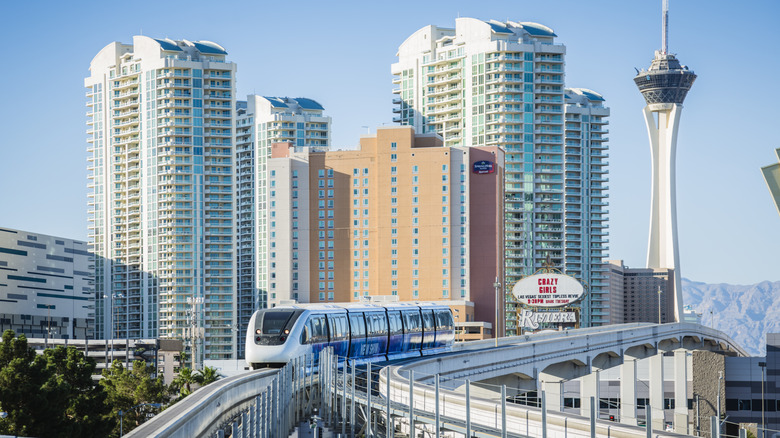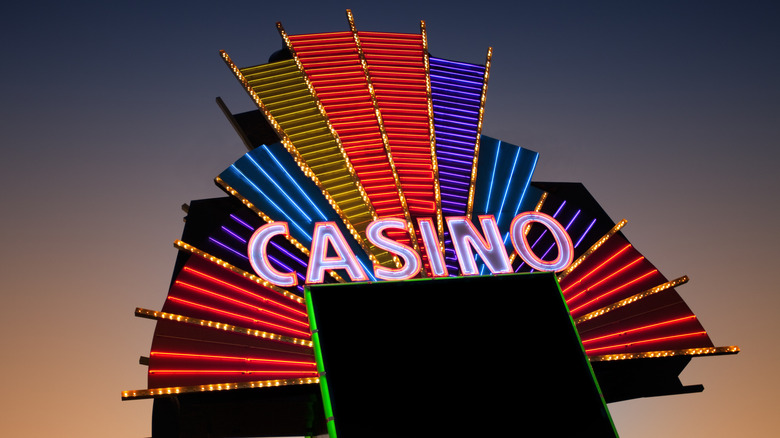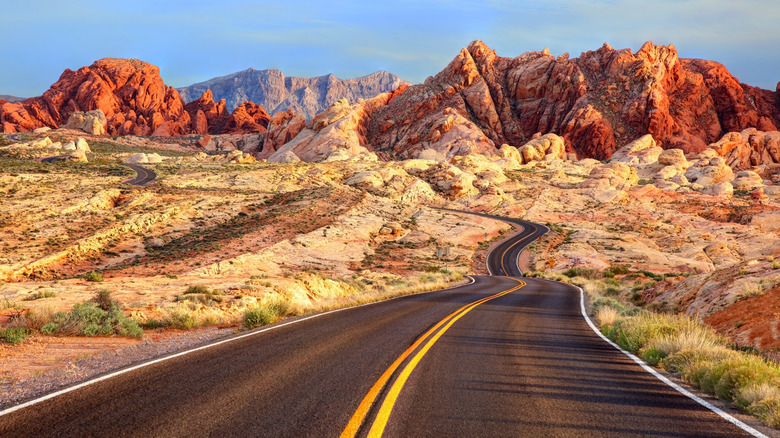Missing out on deals
Las Vegas is overflowing with freebies, bargains, and instant rebates, and seasoned travelers may enjoy gaming the system as much as playing the actual games. If you’ve never visited Las Vegas before, you may approach the city like any other vacation: book a hotel, make some dinner reservations, and arrange a tour or two. That’s fine; you’re smart to plan ahead. But you may also leave yourself room to improvise. Once you hit the tarmac, Las Vegas institutions will offer anything they can to lure you through their front doors.
To start, Las Vegas hotels run an endless stream of promotions, and you can often snag your room for a song. (To do this, it’s best to book directly with the hotel, not through a third-party website). Once you arrive at your hotel, ask about memberships and “comps.” These loyalty programs are almost always free, and members end up with a “player’s card,” which rewards them for playing games in the casino. You accumulate points throughout your visit and can redeem them for room upgrades, discounted show tickets, and restaurant coupons. Once you get the hang of it, you will start spotting promos everywhere to uncover free things to do in Vegas.
Picking the wrong hotel

“Where are you staying?” Vegas veterans ask this all the time, because your hotel says a lot about what kind of trip you’ll have. The biggest resorts have some sort of theme, such as Caesars Palace, with its Italianate architecture, or New York New York, with its painstaking replica of the Manhattan skyline. If you love Arthurian legends and want to see trained stuntmen dressed as knights jousting each other, then the Excalibur Hotel is the ideal choice. Clowns and acrobats at any hour of the day? Head to Circus Circus.
There’s always the chance that you’ll pick the wrong hotel, not just because you don’t care for its gimmick, but because you’re far from the things you do want to see. Getting around Las Vegas can be tricky, and although the Strip may seem contained (it’s basically just one road), the length of Las Vegas Boulevard is about four miles. This is a long, busy corridor, and the less you have to walk or hail cabs, the better. The more popular resorts strive to be self-contained experiences, especially when summer temperatures break 100 degrees. If you don’t love the hotel you’ve chosen, you may hate it by the time you leave.
Not knowing how to get around

Theasis/Getty Images
Many U.S. travelers are accustomed to driving, so they rent a car in Las Vegas without thinking about it. This can be a good idea, especially if you want to explore the broader region around the city or plan to visit several local sights within city limits, such as the Mob Museum on one end of town and the Olympia Sports Park on the other. Driving yourself can be a much cheaper alternative to taking taxis everywhere.
But Las Vegas is a surprisingly foot-friendly city. Lots of folks spend their entire vacation on the Strip, which has wide sidewalks and pedestrian bridges over the multi-lane boulevard. Better yet, you can hop on the Las Vegas Monorail, a 3.9-mile mass transit system that carries passengers back and forth along the city’s busiest route. This system is scenic and relaxing, and it’s way less expensive than getting around on four wheels. Thanks to these amenities, many tourists see no reason to drive, and their rental cars end up sitting in a parking garage for days on end. Indeed, people who want to stick to the hotel, splash in the pool, and play a lot of card games may not need a car at all.
Playing too early, too fast

Anton27/Shutterstock
Casinos are designed to pull you in and occupy you for as long as possible, so it’s no surprise that lots of rookies blow all their money on the first day. It’s not just the casino itself. There are also roller coasters to ride, room service meals to order, and outrageous cocktails to sip. Few cities on Earth are as skilled at separating you from your cash — and there’s nothing more embarrassing than looking up from a Texas Hold’em screen at 2 a.m. and realizing you’ve spent everything on a digital game built into the bar.
Your best bet is to set a budget for each day. This may not sound like free-wheeling fun, but if you can lose up to, say, $200 each day without breaking the bank, you can at least rest assured you’ll still be able to pay your hotel’s room service bill. If your luck changes for the better, you can add these winnings to your personal pot and up your ante. But compulsive gambling can be serious business. If someone in your party is truly losing scary amounts of money and struggling to stop, the Nevada Council on Problem Gambling has a hotline you can call: 1-800-GAMBLER. Addiction can be a life-ruining problem, and many visitors don’t realize they’re susceptible until they step into their first casino.
Expecting to win

Pgiam/Getty Images
Some folks are professional card players. They play for huge pots, they excel at sizing up other players, and they know how to handle winning and losing. Mathematically-minded players may walk up to a blackjack table and “count cards,” a practice that isn’t illegal and drives croupiers crazy. If you have any of these superpowers, you’ve probably already been to Vegas and don’t need any tips.
But for most of us, gambling isn’t a profession, and we shouldn’t treat it like one. Most visitors play slots and roulette tables because they’re fun; it’s exciting to place bets and maybe score some extra chips. The winds of fortune can always change, and none of us should expect to make money — never mind win big — in a casino. Altogether, players lose more than a billion dollars in a single year at Las Vegas blackjack tables, plus billions more at machines and other games. You have likely heard the old adage that “the house always wins.” If you’re wise, you’ll take these words to heart, as this is the biggest secret casinos don’t want you to know.
Getting disoriented

Jhorrocks/Getty Images
According to tradition, casinos don’t have clocks. You’re on vacation, so why should you worry about keeping time? Also, the management wants you to stick around and place bets for as long as possible. The second you leave, you stop spending money, so they’ll use any strategy to keep you close by, from free drinks to live musicians. Casinos almost never have windows, so unless you think to check your phone, the time could be 3 p.m. or 3 a.m.
Las Vegas hotels tend to be enormous as well, with multiple levels, broad concourses, and hallways that lead in all directions. This can be exciting at first, as you wind your way into the resort; but the dim lighting and absence of clear signage can feel increasingly confusing. Many argue that the maze-like architecture of a standard casino is by design, so visitors can’t just walk out the door and do something else. The flashing lights and relentless noise of the machines only add to the confusion. If you don’t know what the hour is or exactly where you are, wandering a casino can be a disorienting experience, which leaves many newcomers exhausted.
Assuming the weather will cooperate

Belfasteileen/Getty Images
If you didn’t grow up in Nevada, the Mojave Desert feels like a strange ecosystem. The “dry heat” can sneak up on you, especially in the summer when the sun is its deadliest. On sunny days, exposure and dehydration are serious concerns. But it can also get chilly; summer evenings can drop to 60 degrees, and visitors often regret not packing a sweatshirt. Winters are downright cold, with lows below freezing. Every major building in Las Vegas is temperature-controlled, and most of its entertainment takes place indoors. But step through that door, and the climate can be a literal shock to the system.
Most surprising of all, the period between June and September is known as “monsoon season,” when the flawless blue skies fill up with clouds and dump rain all over the city. This may seem counterintuitive in such a dry region, but Las Vegas is known for its dramatic thunderstorms, which can alarm newbies with upper-story hotel rooms and no umbrella. Meanwhile, the packed soil doesn’t absorb water well, and flash floods can be a serious danger. If you have to drive during a major storm, prepare yourself for limited visibility and hydroplaning, and don’t hesitate to pull over and wait it out. Most storms hit hard and clear up within a couple of hours.
Underestimating the entertainment

Alina555/Getty Images
Almost every tourist in Las Vegas expects casinos and cocktails, but many people forget just how world-class its live performances are. The Strip is just like New York’s Broadway, except with bigger auditoriums, larger budgets, and celebrities who play for years. Some people come here expressly for the entertainment. Cirque du Soleil is a permanent fixture, with one or more productions running at a single time, and Penn & Teller have performed magic here for decades. Las Vegas showcases some of the most famous comedians in the world, and you can find concerts and burlesque shows any night of the week. Simply put, there are plenty of things to do in Las Vegas that aren’t gambling.
You may not even know these options exist until you see them advertised on a 50-foot jumbotron. If you’re too heavily scheduled, you may not have any time to catch a show on a whim. At the same time, admission can get expensive, even for nosebleed seats on a Sunday matinee, and the bigger shows tend to sell out altogether. One tactic is to book your must-see entertainment in advance or see whether your hotel package offers a deal. Another strategy is to set aside a large portion of your time and budget for when you arrive. You can often find last-minute bargains for unsold tickets at services like Tix4Tonight, which has several kiosks in town.
Getting into trouble

Wsfurlan/Getty Images
With a nickname like “Sin City,” Las Vegas has well earned its reputation for reckless behavior. Some of the town’s early investors were bona fide mafia dons, and you don’t have to be Hunter S. Thompson to stir up some wild times. Many activities that would be illegal in other places, such as smoking marijuana, strolling down the street with an open container, or visiting a licensed brothel, wouldn’t even raise an eyebrow here.
Yet, not everyone can handle that level of freedom, and newcomers often land themselves in actual trouble. Maybe they consume too many free drinks. Maybe they get too rowdy at a club. Maybe they meet the wrong people and get talked into something they wouldn’t normally do. Las Vegas does flaunt an anything-goes atmosphere, which can cause some visitors to push it too far.
You should exercise special caution in casinos, which have some of the tightest security in the world. Every inch of a gaming floor is watched through CCTV cameras, and guards — uniformed and undercover — roam the tables in search of troublemakers. In short, this is a rough place to make truly bad decisions, and it’s best to keep yourself in check.
Staying in the city the whole time

Denistangneyjr/Getty Images
Nevada is a beautiful state, with snow-capped mountains, pine-rich forests, and scenic lakes. When visiting Las Vegas, outdoor enthusiasts will appreciate the spectacular rock formations of the Valley of Fire, only an hour’s drive northwest of Las Vegas, making it a natural day-trip destination. You’re a similar distance from the glittering waters of Lake Mead and the colossal concrete wall of Hoover Dam. Because the Las Vegas airport is so well connected, the city is a natural gateway for road-trippers. Spend a couple of days driving to the Grand Canyon and back, or through Death Valley, or across the Mojave Natural Preserve.
In other words, there’s every reason to take a break from the city and explore the region. Las Vegas may be fun, but the cycle of gambling and partying and watching shows can get repetitive, especially with so much open space to see. Tours are easy to organize, whether you want to ride a bike down some single track or fly a helicopter over desert crags. If you can’t find time to leave the Strip on your first visit, don’t worry; Vegas will always invite you back.

